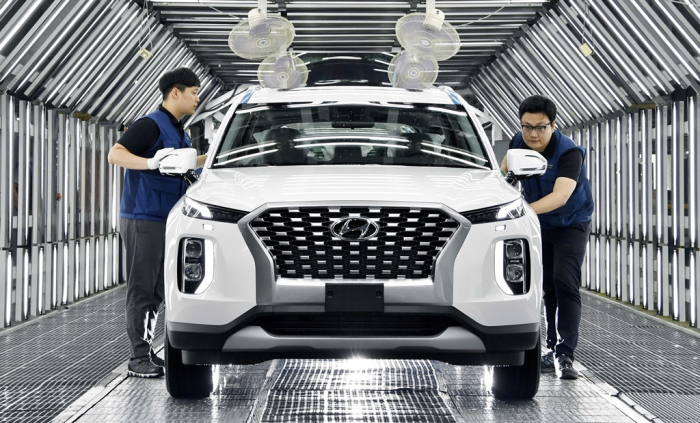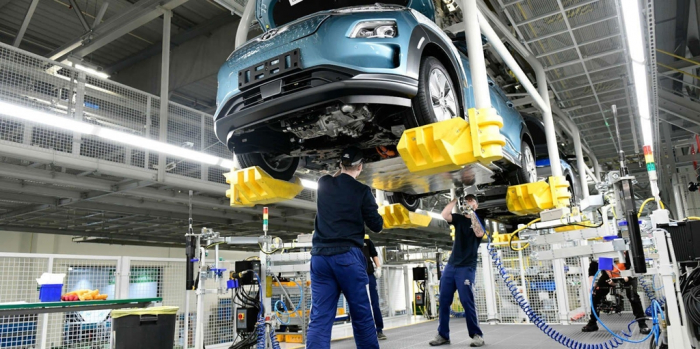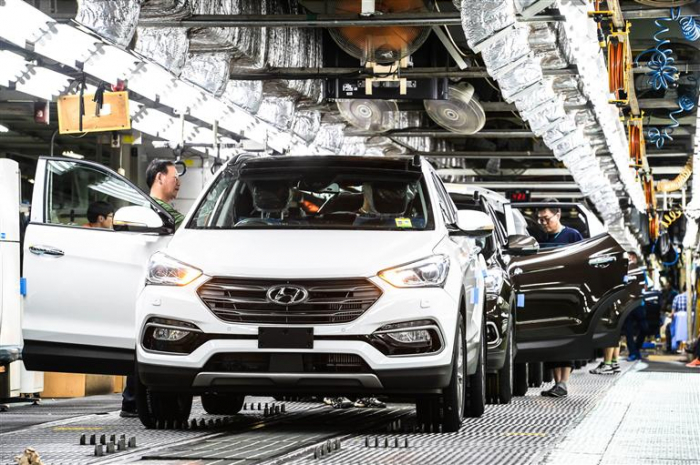Automobiles
Hyundai to adopt multiple car assembly system at local plant from August
The method, already employed at its overseas plants, will improve its productivity and efficiency in manufacturing diverse models
By Mar 23, 2022 (Gmt+09:00)
3
Min read
Most Read
LG Chem to sell water filter business to Glenwood PE for $692 million


Kyobo Life poised to buy Japan’s SBI Group-owned savings bank


KT&G eyes overseas M&A after rejecting activist fund's offer


StockX in merger talks with Naver’s online reseller Kream


Mirae Asset to be named Korea Post’s core real estate fund operator



Hyundai Motor Co. is introducing a multiple vehicle assembly system at its main plant in South Korea to better respond to rising market demand for diverse models of high quality.
According to industry sources on Wednesday, the top Korean automaker will adopt a multi-product batch system at its third factory in Ulsan, southeast of Seoul, in August.
For the introduction of the new assembly method, the company will overhaul the third plant twice, with the first construction work scheduled for late April and the second construction work in late July, the sources said.
If the assembly system works successfully, the automaker and its affiliate Kia Corp. will introduce it to other factories in Korea, they said.
Hyundai’s third Ulsan plant currently makes the Avante compact sedan, the small Venue SUV and the Hyundai i30 family car – mostly one type each per assembly line.

The manufacturing method will allow the automotive group to produce up to 10 different kinds of cars on a single assembly line by moving all components needed to make an individual car on a cart along with the car on the production line throughout the whole process.
The system is suitable for producing various types of cars on a single assembly line, eliminating the need to build additional plants if a new model is temporarily in high demand.
Under the current mass production system, Hyundai produces just one or two different types of cars on a single production line with the same auto parts heavily stacked behind the assembly conveyer belt.
As opposed to mass production where changes cannot be easily made, batch production is good for quality control, with problems fixed quickly. Also, Hyundai workers will be able to install different components, tailored to customer requests, on the same type of cars, according to industry officials.
TO ENHANCE PRODUCTIVITY, EFFICIENCY
A number of leading global automakers such as General Motors Co., Toyota Motor Corp. and Volkswagen AG are already employing a similar multi-product, small-batch production system.
In Korea, Renault Motor Korea is using the system at its main plant in Busan.
Hyundai Motor has already adopted such a system at its overseas plants, including those in the US, China and Brazil.
However, the company hasn’t introduced the system to the production bases in Korea largely due to objections from its labor union.

Its unionized workers have opposed the system, saying that making several cars on one production line will add to employees' workload and could result in fewer assembly lines, which may lead to job cuts.
As Hyundai struggles to compete against its rivals, particularly in China, the world’s top car market, Hyundai workers have agreed to also apply the production method to locally produced cars to improve productivity.
Meanwhile, as part of its efforts to enhance productivity and factory efficiency, Hyundai is manufacturing one type of car at different plants.
Hyundai’s large-size SUV, the Palisade, is currently produced at its second and fourth plants in Ulsan, while the Staria, Hyundai’s multi-purpose vehicle (MPV), is rolling out of its fourth Ulsan plant and the Jeonju plant.
The company plans to produce the full-changed model of its compact Kona SUV at both the first and third Ulsan plants from next year.
Write to Byung-Uk Do at dodo@hankyung.com
In-Soo Nam edited this article.
More to Read
-
 Electric vehiclesHyundai, BAIC Motor to inject $942 mn in China JV for EVs
Electric vehiclesHyundai, BAIC Motor to inject $942 mn in China JV for EVsMar 20, 2022 (Gmt+09:00)
2 Min read -
 AutomobilesHyundai, Lotte to join used car market, seen as boost for small players
AutomobilesHyundai, Lotte to join used car market, seen as boost for small playersMar 18, 2022 (Gmt+09:00)
3 Min read -
 AutomobilesHyundai to make IONIQ 5 in Indonesia, EV hub for ASEAN market
AutomobilesHyundai to make IONIQ 5 in Indonesia, EV hub for ASEAN marketMar 16, 2022 (Gmt+09:00)
3 Min read -
 Future mobilityHyundai Motor invests in cloud, hydrogen firms for future mobility
Future mobilityHyundai Motor invests in cloud, hydrogen firms for future mobilityMar 17, 2022 (Gmt+09:00)
2 Min read -
 War in UkraineHyundai’s auto exports to Russia cut by half in February, hit by war
War in UkraineHyundai’s auto exports to Russia cut by half in February, hit by warMar 14, 2022 (Gmt+09:00)
3 Min read
Comment 0
LOG IN


